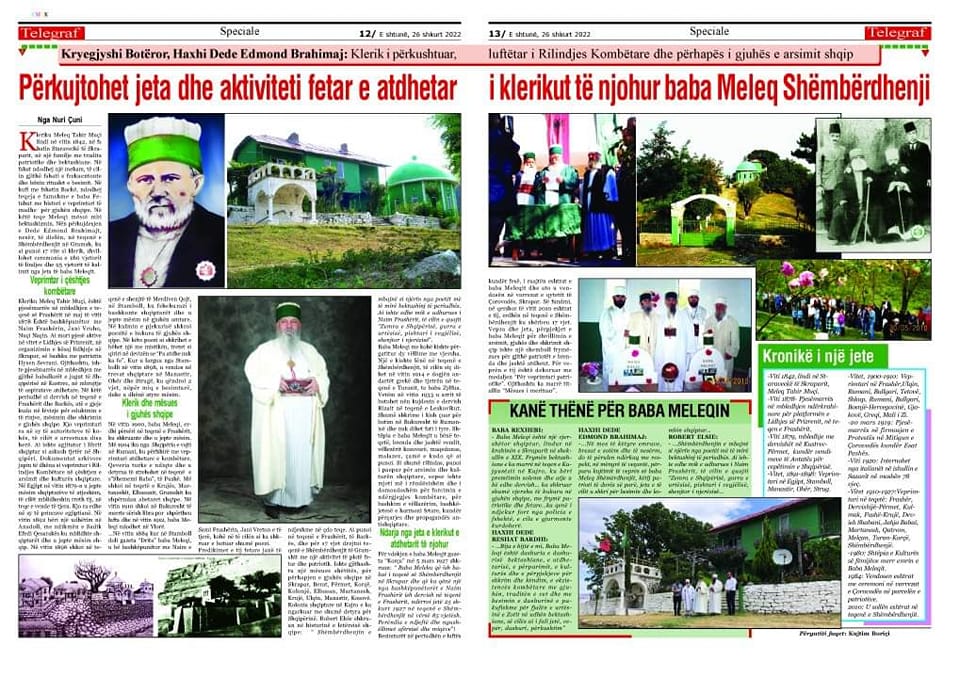World Leader, Haxhi Dede Edmond Brahimaj : Dedicated cleric, fighter of the National Renaissance and propagator of the language of Albanian education.

By Nuri ÇUNI
The cleric Meleq Tahir Muçi was born in 1842, in the village of Starveckë of Skrapar, in a family with patriotic and Bektashi traditions. In the village there was a mekam, which the whole village frequented and performed the rituals of faith. On the border with the village of Backë, there was the famous tekke of father Fetahu with great history and activity for the Albanian language. In this tekke Meleqi learned about Bektashism. Under the auspices of Dede Edmond Brahimaj, tomorrow, Sunday, in the tekke of Shëmbërdhenji in Gramsh, where he worked for 17 years as a clergyman, the ceremony of the 180th anniversary of his birth and the 95th anniversary of the passing away of father Meleqi takes place.
National cause activist
The cleric Meleq Tahir Muçi, is a participant in the meeting of the tekke of Frashëri in May 1878, he is a collaborator with Naim Frashëri, Jani Vruho, Nuçi Naçi. He took an active part in the years of the League of Prizren, in the organization of this union in Skrapar, together with the patriot Hysen Sevrani. He was also a participant in the meeting with all the fathers of southern Albania in Kostrec, in defense of patriotic aspirations. In this period as a dervish in the tekke of Frashër and Backa, you find him everywhere on the move for the education of young people, learning and writing the Albanian language. This activity caught the eye of the authorities of the time, who arrested him several times. He was an agitator of the Albanian book like no other in Albania. Archival documents provide data as an activist of the National Renaissance in the issue of Albanian education and culture. In Egypt in 1879 he taught to the Albanians there, who gathered around him, in tekkes and other places. This also caught the eye of the Egyptian princes. In 1892 he made a trip to Anatolia, with the help of Sadik Efedi Qesaraka where he gathered Albanians and taught them Albanian. In 1896 he went to the holy tekke of Merdiven Qojt, in Istanbul, where he secretly united the Albanians and taught them in their mother tongue. At the height of his maturity he wrote beautiful poems of the Albanian language. In these poems he merges and becomes one with mysticism, melts like a candle in the motto that "Without homeland there is no religion". When he left Istanbul in 1898, he settled in the Albanian territories in Bitola, Ohrid and Struga, where he stayed for 2 years, with friends and believers, teaching them. in tekkes and other places. This also caught the eye of the Egyptian prince. In 1892 he made a trip to Anatolia, with the help of Sadik Efedi Qesaraka where he gathered Albanians and taught them Albanian. In 1896 he went to the holy tekke of Merdiven Qojt, in Istanbul, where he secretly united the Albanians and taught them in their mother tongue. At the height of his maturity he wrote beautiful poems of the Albanian language. In these poems he merges and becomes one with mysticism, melts like a candle in the motto that "Without homeland there is no religion". When he left Istanbul in 1898, he settled in the Albanian territories in Bitola, Ohrid and Struga, where he stayed for 2 years, with friends and believers, teaching them. in tekkes and other places. This also caught the eye of the Egyptian princes. In 1892 he made a trip to Anatolia, with the help of Sadik Efedi Qesaraka where he gathered Albanians and taught them Albanian. In 1896 he went to the holy tekke of Merdiven Qojt, in Istanbul, where he secretly united the Albanians and taught them in their mother tongue. At the height of his maturity he wrote beautiful poems of the Albanian language. In these poems he merges and becomes one with mysticism, melts like a candle in the motto that "Without homeland there is no religion". When he left Istanbul in 1898, he settled in the Albanian territories in Bitola, Ohrid and Struga, where he stayed for 2 years, with friends and believers, teaching them. with the help of Sadik Efedi Qesaraka where he gathered Albanians and taught them Albanian. In 1896 he went to the holy tekke of Merdiven Qojt, in Istanbul, where he secretly united the Albanians and taught them in their mother tongue. At the height of his maturity he wrote beautiful poems of the Albanian language. In these poems he merges and becomes one with mysticism, melts like a candle in the motto that "Without homeland there is no religion". When he left Istanbul in 1898, he settled in the Albanian territories in Bitola, Ohrid and Struga, where he stayed for 2 years, with friends and believers, teaching them. with the help of Sadik Efedi Qesaraka where he gathered Albanians and taught them Albanian. In 1896 he went to the holy tekke of Merdiven Qojt, in Istanbul, where he secretly united the Albanians and taught them in their mother tongue. At the height of his maturity he wrote beautiful poems of the Albanian language. In these poems he merges and becomes one with mysticism, melts like a candle in the motto that "Without homeland there is no religion". When he left Istanbul in 1898, he settled in the Albanian territories in Bitola, Ohrid and Struga, where he stayed for 2 years, with friends and believers, teaching them. melts like a candle in the motto that "Without homeland there is no religion". When he left Istanbul in 1898, he settled in the Albanian territories in Bitola, Ohrid and Struga, where he stayed for 2 years, with friends and believers, teaching them. melts like a candle in the motto that "Without homeland there is no religion". When he left Istanbul in 1898, he settled in the Albanian territories in Bitola, Ohrid and Struga, where he stayed for 2 years, with friends and believers, teaching them.
Clergyman and teacher of the Albanian language
In 1900, Father Meleqi came again to the tekke of Frashër, where he wrote and taught. In 1904 he left Albania and went to Romania, where he was involved in patriotic and national activities. The Turkish government pursued him and he was forced to take refuge in the tekke of "Shememi Baba", in Fushë Kruja. He took me to the tekkes of Kruja, Martanesh, Elbasan, Gramsh where he distributed Albanian primers. In 1910 he went to Bucharest to get books again but the war broke out and in 1912, father Meleqi is in Vlora.
… In 1884, when the newspaper "Drita" was published in Istanbul, Baba Meleqi became a collaborator of Naim and Sami Frashëri, Jani Vreto and others, during which time he wrote and published many poems.
His religious sermons are sensitive in every tekke. He worked in the tekke of Frashër, Backa, and for 17 years led the tekke of Shëmbërdhenji of Gramsh with a full religious and patriotic activity. He was also a traveling teacher, for the spread of the Albanian language in Skrapar, Berat, Përmet, Korçë, Kolonjë, Elbasan, Martanesh, Krujë, Ulqin, Bitola, Kosovo. The Albanian colony in Cairo has charged it with many tasks for Albania. Robert Elsie writes in the history of Albanian literature: “Shëmërdhenji is considered one of the best Bektashi poets of the period. He was also a friend and worshiper of Naim Frashëri, whom he called "The heart of Albania, the fountain of wisdom, the torch of childhood, the saint of humanity."
Baba Meleqi had prepared two volumes of poems in time. One had left it in the tekke of Shëmbërdhenji, which as we know in 1914 was burned by the Greek andartes and the other in the tekke of Turan, at father Zylfua. Only in 1933 was it published under the auspices of the dervish Riza in the tekke of Leskovik. Many writings had been sent to Bucharest, Romania for publication, and their fate is unknown. Father Meleqi's house became tekkes, inside and outside the country, Kosovar brothers, Macedonians, Montenegrins, Chams and wherever he worked. Like many renaissances, he worked tirelessly for Albanian education and culture because it was the most important and necessary tool for strengthening national consciousness, for unity and brotherhood, coexistence and religious harmony, against disunity and anti-Albanian propaganda.
Separation from the life of the clergyman of the well-known patriot
On the death of Baba Meleqi, the newspaper "Korça" on March 5, 1927 writes: of Frashër, passed away on February 25, 1927 in the tekke of Shëmbërdhenji at the age of 85. God bless you and the comforts of closeness and friends ”!
Believers in the period of the war against religion, preserved the remains of father Meleqi and they were placed in the cemetery of the town of Çorovoda, Skrapar. Finally, in June 2010, his remains came to the Shëmbërdhenji tekke where he served for 17 years. The work and life, the efforts of father Meleqi for the development of education, language and Albanian writing was an inspiring example for all patriots inside and outside the homeland. For his work he was decorated with the medal "For patriotic activities". He also received the title "Deserved Teacher".
THEY SAID ABOUT BABA MELEQI
Baba Rexhebi : Baba Meleqi is an Albanian poet, born in the province of Skrapar in the XIX century. He took the Bektashi spirit in the tekke of Kajgusëz in Cairo, where he made the solemn promise and there he became a dervish… he wrote many beautiful poems in Albanian, with a patriotic and religious spirit… he was closely followed by the secret police, and which always tracked him down.
Haxhi Dede Reshat Bardhi: … My daughters and sons, Baba Meleqi is the love of Bektashi love, patriotism, progress, culture and efforts for writing and reading, national existence with its own language, tradition and faith and love boundless for the word and wisdom of God in the Bektashi way, to which he forgave life, deed, love, devotion ”
Haxhi Dede Edmond Brahimaj : Between these names, today and tomorrow, generations will bow with respect, in a special way, before the memory of the work of father Meleq Shëmërdhenji, this first-hand patriot, his life who was dissolved for the Albanian faith and nation…
Robert Elsie :… Shëmërdhenji is considered one of the best Bektashi poets of the period. He was also a friend and worshiper of Naim Frashëri, whom he called "The heart of Albania, the fountain of wisdom, the torch of childhood, the saint of humanity"
Chronicle of a life
- Year 1842, was born in Staravecka of Skrapar, Meleq Tahir Muçi.
-Year 1878- Participant in the inter-provincial meeting for the platform of the League of Prizren, in the tekke of Frshër.
-Year 1879, meeting with dervishes in Kustrec-Përmet, against the decisions of Antata for the partition of Albania.
Years, 1891-1898: Activity in Egypt, Istanbul, Bitola, Ohrid, Struga.
Years, 1900-1910: Activities in Frashër, Ulcinj, Romania, Bulgaria, Tetovo, Skopje, Romania, Bulgaria, Bosnia and Herzegovina, Gjakova, Greece, Montenegro.
-20 March 1919: Participant in the signing of the Protest in the Çorovoda Rally against Esat Pasha.
1920 - Exiled by Italians to the island of Sazan at the age of 78.
Years 1910-1927: Activity in tekkes: Frashër, Dervishija-Përmet, Kulmak, Fushë-Krujë, Devish Shabani, Jahja Babait, Martanesh, Qatrom, Melçan, Turan-Korçë, Shëmbërdhenjë.
-1980: The Children's House of Culture takes the name of Baba Meleqi.
1984: The remains are ceremoniously placed in the Çorovoda cemetery on the patriots' plot.
2010: The remains were brought to the tekke of Shëmbërdhenji.
Prepared by: Kujtim BORIÇI
